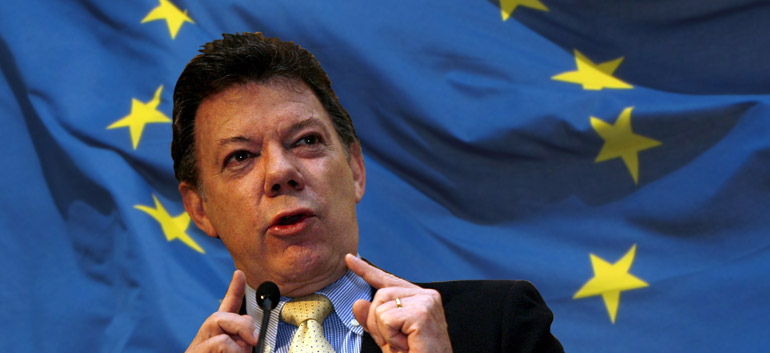President Juan Manuel Santos’ said over the weekend that his tour through Europe was “satisfactory” in spite of returning with no explicit support for a type of “Marshall Plan” for Colombia in the event peace is signed with rebel group FARC.
MORE: Santos begins European tour to seek funds for peace in Colombia
“The support we received has been more than we had hoped for,” Santos told press after his visit to British Deputy Prime Minister Nick Clegg, the replacement of PM David Cameron who was in Helsinki to discuss European Union budget issues.
While the Colombian head of state did get the British vice PM to put on a dove-shaped pin, Clegg promised nothing but ongoing “support” for the peace talks that have been ongoing over the past two years.
However, like the leaders of Portugal, Belgium, France and Spain before him, Clegg did not commit to financially aiding the process or to the creation of a fund Colombia seeks to finance a post-conflict “Marshall Plan.”
The only European leader who did was Germany’s Angela Merkel who on Wednesday confirmed her government had approved a $95 million loan in the event a peace agreement with the Marxist rebels is signed.
MORE: Brussels, Berlin back Colombia’s peace efforts after Santos visit
However, this loan had been approved last month already, well before Santos’ trip.
MORE: Colombia’s ‘Marshal Plan for Peace’ begins to take shape
Before crossing the Atlantic, Santos had stressed that “we still are not requesting resources, but that they take the necessary steps to legally constitute the fund that will be one of the funds to finance the projects of the post-conflict.”
Colombia Foreign Minister, Maria Angela Holguin, told newspaper El Tiempo on Sunday that the creation of this fund received “unanimous” support in all countries visited by the president.
“We did not go looking for resources, we did not pass around the hat. What we proposed — and for this there was unanimous support — was the creation of a fund to be ready at the moment the peace deals are signed,” Holguin told the daily.
However, while in the words of the foreign minister there was unanimous support for the creation of this fund, none of the European leaders mentioned a word about this in their communications to the press.
The President of the European Council, Herman van Rompuy, said the European Union will provide “concrete assistance … once negotiations are concluded.”
The president of the European Parliament, German socialist Martin Schulz, recognized Colombia “needs the political and financial backing of all those who seek a peaceful and lasting solution for the country, both at home and abroad” but said nothing about a possible response from the European legislative branch.
Schulz’ own fraction of progressive and socialist legislators has long been critical of Colombia’s long list of human rights abuses and ongoing attempts in Congress that seek to transfer alleged crimes committed by members of the military to military tribunals with a track record of providing impunity.
A former fraction member of Schulz in German parliament, Heike Hansel, said “it is incomprehensible that Colombia seeks financial aid for the post-conflict Colombia, the construction of peace and the financing of democratic structures, while continuing to maintain more than 500,000 active soldiers with their corresponding high budgetary spending,” Hansel said.
Santos has so far failed to mention possible cuts in the $13 billion a year for the Defense Ministry. Instead, just before leaving for Europe, the President promised a “stronger, more modern” military after signing a peace deal.
When proposing the 2015 budget, the Santos administration asked Congress to maintain the defense budget, while not allocating funds for a possible peace deal or key ministries like Agriculture who are expected a crucial role in rural reform.
MORE: Peace can bring more violence, says Colombia’s defense minister in defense of budget
The peace talks began two years ago this month. Despite the fact the president initially promised the negotiations would last no longer than a year, no money has been reserved for the implementation of an eventual pact anywhere.
Colombia primarily will need funds to compensate some 6 million victims, implement a rural reform agreement with the FARC, and increase government operations in areas now mainly controlled by the guerrillas.
Sources
- ‘Hay un apoyo incondicional de Europa a la paz en Colombia’: Canciller (El Tiempo)
- Schulz on the visit of the President of Colombia Juan Manuel Santos (European Parliament)
- ‘El mundo entero está siguiendo con mucho interés lo que está pasando en Colombia’: Presidente Santos (President’s Office)
- ‘Esta es la última y única oportunidad para la paz en Colombia’: Reino Unido (President’s Office)
- Remarks by the President of the European Council Herman Van Rompuy following his meeting with President of Colombia Juan Manuel Santos (European Council)


